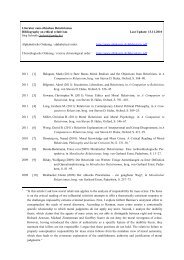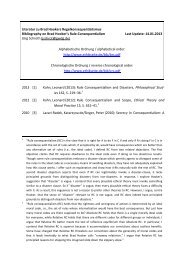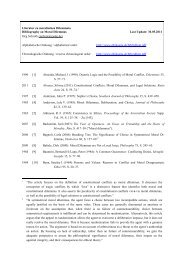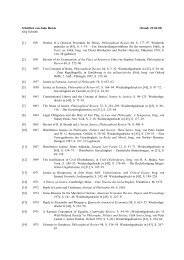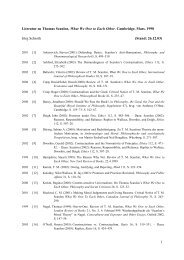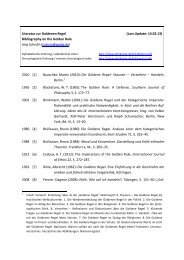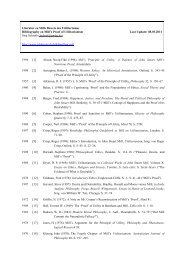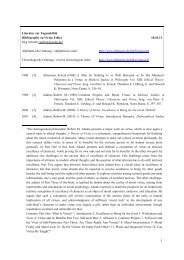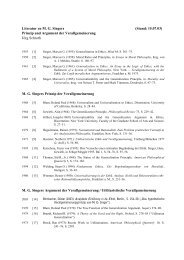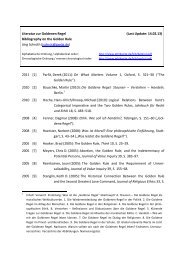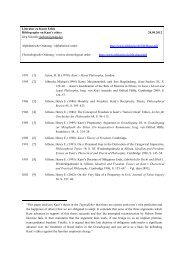Chronologische - Ethikseite
Chronologische - Ethikseite
Chronologische - Ethikseite
Create successful ePaper yourself
Turn your PDF publications into a flip-book with our unique Google optimized e-Paper software.
Motivation. Kant und die Alternativen, hrsg. von Heiner F. Klemme, Manfred Kühn<br />
und Dieter Schönecker, Hamburg, S. 23–37.<br />
2006 [308] Baum, Manfred (2006): Gefühl, Begehren und Wollen in Kants praktischer Philosophie, Jahrbuch<br />
für Recht und Ethik 14, hrsg. von B. Sharon Byrd, Joachim Hruschka und Jan C.<br />
Joerden, S. 125–39.<br />
2006 [309] Beck, Gunnar (2006): Immanuel Kant’s Theory of Rights, Ratio Juris 19, S. 371–401. 89<br />
2006 [310] Bencivenga, Ermanno (2006): Ethics Vindicated: Kant’s Transcendental Legitimation of<br />
Moral Discourse, Oxford. 90<br />
2006 [311] Bernecker, Sven (2006): Kant zur moralischen Selbsterkenntnis, Kant-Studien 97, S. 163–83. 91<br />
2006 [312] Brandt, Reinhard (2006): Die Selbstverwirklichung des Menschen in der Kantischen<br />
Moralphilosophie (Ein Stenogramm), in Moralische Motivation. Kant und die<br />
Alternativen, hrsg. von Heiner F. Klemme, Manfred Kühn und Dieter Schönecker,<br />
89 “It is common for Kant’s rights-based liberalism to be contrasted with the communitarian authoritarianism<br />
of the later Fichte and of Hegel, and it is the concept of autonomy that is generally regarded as the<br />
theoretical fount of Kant’s theory of natural rights, providing the analytical link between Kant’s moral<br />
philosophy and his political and legal theory. The author argues that this view is erroneous: The notion of<br />
autonomy ultimately remains contentless and incapable of providing practical political and legal<br />
prescriptions without Kant’s substantive account of human nature, an account specifying both the proper<br />
moral ends that humans should strive for and the anthropological limits of human perfectibility. Kant’s<br />
theory of rights is informed by both sets of considerations. Contrary to the received view, Kant develops a<br />
socially sensitive account of the self in his later writings, and comes to believe that individual autonomy<br />
depends in large measure on the realisation of certain propitious sociocultural and political arrangements.<br />
For Kant, natural rights, like individual freedom, are not ahistorical, universal standards of political justice<br />
but the historical outcome of the long process of enlightenment. As such, what is right will depend on what<br />
is timely. Here Kant is much closer to Fichte and Hegel than is generally acknowledged.”<br />
90 “Can we regard ourselves as having free will? What is the place of values in a world of facts? What grounds<br />
the authority of moral injunctions, and why should we care about them? Unless we provide satisfactory<br />
answers to these questions, ethics has no credible status and is likely to be subsumed by psychology, history,<br />
or rational decision theory. According to Ermanno Bencivenga, this outcome is both common and<br />
regrettable.<br />
Bencivenga points to Immanuel Kant for the solution. Kant’s philosophy is a sustained, bold, and successful<br />
effort aiming at offering us the answers we need. Ethics Vindicated is a clear and thorough account of this<br />
effort that builds on Bencivenga’s previous interpretation of transcendental philosophy (as articulated in his<br />
Kant’s Copernican Revolution) and draws on the entire Kantian corpus.”<br />
91 „Der intentionalistischen Ethik oder Gesinnungsethik zufolge ist das, was an einer Handlung moralisch beurteilt<br />
wird, die Handlungsabsicht oder Intention. Der bedeutendste Vertreter des ethischen Intentionalismus,<br />
Immanuel Kant, spricht freilich nicht von „Absichten“ sondern von „Maximen“. Dem hier zugrundegelegten<br />
Verständnis zufolge sind Maximen weder Handlungsmotive noch Handlungsstrukturen, sondern<br />
Handlungsabsichten. Jedoch ist nicht jede beliebige Absicht eine Maxime. Eine Maxime zu haben, heißt für<br />
Kant, sich bewußt entschlossen zu haben, so-und-so zu handeln. Handeln nach Maximen ist regelgeleitetes<br />
Verhalten. Der Begriff der Maxime bezieht sich nur auf okkurente (nicht auf dispositionale) Absichten. Und<br />
schließlich sind Maximen solche Absichten, die nicht auf eine singulare Verwirklichung abzielen, sondern<br />
für einen ganzen Lebensbereich das leitende Handlungsprinzip aufstellen.“



